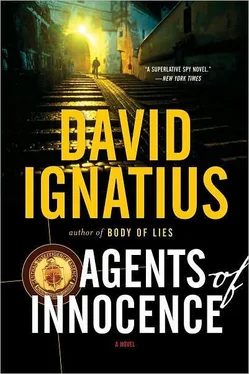David Ignatius - Agents of Innocence
Здесь есть возможность читать онлайн «David Ignatius - Agents of Innocence» весь текст электронной книги совершенно бесплатно (целиком полную версию без сокращений). В некоторых случаях можно слушать аудио, скачать через торрент в формате fb2 и присутствует краткое содержание. Жанр: Шпионский детектив, на английском языке. Описание произведения, (предисловие) а так же отзывы посетителей доступны на портале библиотеки ЛибКат.
- Название:Agents of Innocence
- Автор:
- Жанр:
- Год:неизвестен
- ISBN:нет данных
- Рейтинг книги:3 / 5. Голосов: 1
-
Избранное:Добавить в избранное
- Отзывы:
-
Ваша оценка:
- 60
- 1
- 2
- 3
- 4
- 5
Agents of Innocence: краткое содержание, описание и аннотация
Предлагаем к чтению аннотацию, описание, краткое содержание или предисловие (зависит от того, что написал сам автор книги «Agents of Innocence»). Если вы не нашли необходимую информацию о книге — напишите в комментариях, мы постараемся отыскать её.
Agents of Innocence — читать онлайн бесплатно полную книгу (весь текст) целиком
Ниже представлен текст книги, разбитый по страницам. Система сохранения места последней прочитанной страницы, позволяет с удобством читать онлайн бесплатно книгу «Agents of Innocence», без необходимости каждый раз заново искать на чём Вы остановились. Поставьте закладку, и сможете в любой момент перейти на страницу, на которой закончили чтение.
Интервал:
Закладка:
And if one of his agents proved to be a terrorist, what would he do about it? Probably nothing, Levi decided. There was always a good argument for doing nothing.
Levi walked along the bank of the Serpentine. Ducks were paddling in the muddy water. Other ducks were waddling off to join their mates asleep on the grass.
The question at hand, Levi reminded himself, was not what he would do if he ran the American networks in the Middle East, but what Rogers would do. What would the great Rogers do, for example, if an officer of the Israeli security service approached him out of the blue in London and hinted that the Israelis were reviving an old plan to kill the CIA’s man in the PLO? What would he say? What emotions would he betray?
Levi headed back toward his hotel, crossing the dirt path that circles Hyde Park. A group of girls on horseback were trotting by, led by a riding master with a prim face and tall black boots. The horses never broke into a canter, let alone a gallop. That was forbidden in Hyde Park. Just a slow, steady trot.
The Rogers game was of more than academic interest for Levi that day. After nearly ten years of imagining his American counterpart, Levi was finally going to meet him. They were both scheduled to attend an anti-terrorism conference hosted by the British Foreign Office. Levi felt nervous, like a voyeur who has watched and imagined someone in secret a thousand times, and is finally about to shake his hand.
The Arabs were everywhere in London that September. In the fancy shops on Knightsbridge buying suits and shoes; in the less fancy shops on Oxford Street buying television sets; even in Marks amp; Spencer’s buying underwear. They were the perfect parvenus: incalculably rich and desperately insecure at the same time. They were a merchant’s dream. The jewelers near the Park Lane hotels had learned to expect Arabs walking in off the street with their mistresses and buying, on the spot, diamond necklaces worth $50,000. There seemed to be no upper limit on what the Arabs would pay for something they wanted. The more expensive it was, the more they seemed to like it. Perhaps they realized-better than anyone else-that with the oil boom of the 1970s, the world had gone off balance. Values were askew. The Arabs had a proverb that summed things up well: “When the monkey reigns, dance before him.”
At hotels around the city, other security officials were gathering for the terrorism conference. Several Frenchmen from the SDECE, looking tough and cagey as roustabouts at a circus; a small group of West Germans, exceedingly competent but wary of demonstrating it in front of their NATO allies, lest they bring back bad memories; the Italians, led by an elegant, white-haired general named Armani, who had survived so many purges and reorganizations of the Italian security service that he was now regarded as indispensable, even by his enemies. All the conferees, except Levi, had splendid hotel rooms, cars at their disposal, generous expense accounts. Counterterrorism, like oil, was a booming business that year.
Across the Park from Levi, Rogers was checking into a grand hotel on Park Lane. The hotel was embarrassingly opulent. A queue of Rolls-Royces stood waiting out front. The hotel doorman looked disdainfully at any tip smaller than a fiver. Through the lobby marched a series of overdressed blondes, many of them on the arms of men twice or three times their age. Professionals, thought Rogers. One of the women, a blonde in a slit skirt, smiled seductively at Rogers. He looked the other way.
Rogers hadn’t really wanted to stay at such a fancy place, but Hoffman had insisted. One of his Saudi clients now owned the hotel, he explained. Why shouldn’t they accept his hospitality? If the world was crazy enough to dump all this money in the laps of the Arabs, reasoned Hoffman, the least the Americans could do was enjoy the spillover. Rogers said he would think about it and then booked a room at a more modest hotel, nearer the American Embassy. But when Hoffman asked again-and said that he was flying in himself from Riyadh just to meet Rogers for dinner-Rogers had relented. How could he say no to Hoffman?
The bellman carried his suitcase to the elevator, making conversation about the weather. Rogers was still in a daze from his flight, unshaven, half-asleep, and slightly hung-over.
As the bellman pushed the button for the fifth floor, a stunning woman walked into the elevator. She was most remarkable, with olive skin and dark hair, wearing an elegant Parisian dress and made up in the china-doll way of a Lebanese princess.
It can’t be, thought Rogers.
He studied the woman from the side: the curve of her body, the black mascara ringing her eyes, the expensive perfume.
It couldn’t be, Rogers thought again.
The elevator doors were closing when a foot, shod in a pair of Bally loafers, kicked them open again. A swarthy man walked in and stood beside the woman. He nuzzled her cheek and whispered in her ear. Rogers strained to hear. The man was talking in Italian and the woman was answering, in Italian. Rogers took a deep breath and exhaled slowly. It was not Solange, after all.
The elevator door opened at the third floor and the couple disappeared down the hall. Rogers felt relieved. That particular wound had taken a long time to heal.
Rogers said the name to himself. Solange Jezzine. What he hadn’t reckoned on, the day he plunged from the heights with Solange in his arms, was the loss of self-esteem. It was like breaking a mirror. It destroyed an image of himself. He hadn’t paid a price with Jane, at least not directly. That was what Rogers had found so disorienting. He had expected the predictable scene: the jealous wife discovers her husband’s infidelity and is shattered by it; the husband confesses his misdeeds and eventually is absolved. But it didn’t happen that way. Rogers was instead left alone with his guilty conscience. Jane knew that something was wrong but didn’t know what it was. She assumed it had to do with work and didn’t press the point. The thought that her husband was sleeping with another woman simply never occurred to her.
That loyalty was at once Rogers’s curse and his salvation. Jane had an image of her husband that did not encompass the possibility of infidelity. She regarded him as virtuous and assumed, therefore, that his conduct would be virtuous. It was that simple. Jane’s noble image of her husband survived in her mind, but not in Rogers’s. And that was the trouble. Rogers found it increasingly painful, as the weeks and months passed, to see this gap between what his wife imagined him to be and what he was. So eventually he confessed. Not to his wife, or to a priest. But to the Near East Division chief, Edward Stone. And he was absolved.
Hoffman greeted Rogers with a loud hello and a bearhug when they met at the entrance to the hotel’s Grill Room. This boisterous greeting perturbed some of the other guests waiting to be seated, but Hoffman didn’t seem to care. The headwaiter addressed him as “Monsieur Hoffman” and escorted him to a table in the corner, facing the door. Next to them sat an Arab gentleman and a pneumatic blonde in a tight black dress and spike heels.
“I love the bimbos in this hotel,” said Hoffman as he sat down.
Rogers laughed. He hadn’t seen Hoffman in years, and had missed his raunchy talk and irreverence. Hoffman looked the same, except more so. His girth had increased slightly, but he had a better tailor now, so it was less obvious. He was smoking a gold-tipped cigarette.
“My friend, we live in the age of excess!” said Hoffman.
“Thanks be to Allah,” said Rogers in Arabic.
“I will give you one example of very recent vintage-about two hours ago, to be precise-that suggests the depths to which our brethren in the land of Allah have sunk. A tale of greed and depravity. Does that have any interest for a prominent government official such as yourself?”
Читать дальшеИнтервал:
Закладка:
Похожие книги на «Agents of Innocence»
Представляем Вашему вниманию похожие книги на «Agents of Innocence» списком для выбора. Мы отобрали схожую по названию и смыслу литературу в надежде предоставить читателям больше вариантов отыскать новые, интересные, ещё непрочитанные произведения.
Обсуждение, отзывы о книге «Agents of Innocence» и просто собственные мнения читателей. Оставьте ваши комментарии, напишите, что Вы думаете о произведении, его смысле или главных героях. Укажите что конкретно понравилось, а что нет, и почему Вы так считаете.












